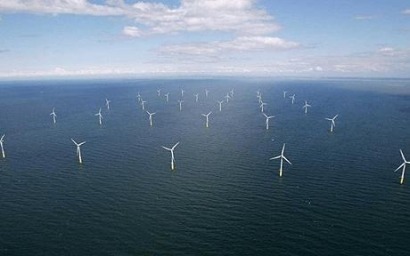
On his return from Abu Dhabi where negotiations on the United Nations Intergovernmental Panel on Climate Change (IPCC) special report on renewable energy drew to a close yesterday, Christain Kjaer, the European Wind Energy Association’s Chief Executive, said: “the message I take home is clear: With renewables, the world will never run out of energy. In fact the total potential for renewables is ‘substantially higher than both the current and projected future global energy demand’”.
The 1,000 page report, which was adopted by 194 governments after marathon negotiations yesterday, considers the potential contribution from biomass, geothermal, hydro, ocean, solar and wind energy, as well as their potential to reduce greenhouse gas emissions, their integration into the energy networks, their contribution to sustainable development, and the policies which are needed to put them in place.
Kjaer estimates that based on the IPCC’s findings, the global renewables sector “could expand by three to more than 10 times by 2050”, and, that there are “few, if any” technological limits to bringing a portfolio of renewable energies online to meet a majority share of total energy demand.
“Based on a review of 168 scenarios, the report shows that renewable energies are growing rapidly and will make greater contributions to a low-carbon energy supply by 2050, than so-called ‘low-carbon’ technologies (nuclear and fossil fuel CCS). This becomes clear when you consider that renewables are already out-pacing nuclear: global renewable energy production of primary energy (12.9%) was more than six times higher than global nuclear energy production (2%) in 2008”, said Kjaer
Wind: 20% of global electricity by 2020
The IPCC reports shows that the global renewable energy revolution is already well underway, with renewables contributing around 19% of the global electricity supply in 2008. By 2030, wind power alone could be providing 10% of the total global electricity supply and in excess of 20% by 2050 – “a massive expansion if you consider that in 2009 wind power met roughly 1.8% of the worldwide electricity demand,” comments Kjaer.
New generation figures are even more striking. “Of the approximate 300 GW of new electricity generating capacity added globally over the two-year period 2008-2009, 140 GW (47%) came from renewable energy additions,” the report states. Rates of growth are particularly impressive for wind power. In 2009 alone, wind power accounted for one fifth of all new capacity additions in the world.
“One key message from the report is that renewable energy sources will be paramount in the global battle against climate change, and their role in saving greenhouse gas emissions will be considerably more important than that of natural gas, carbon capture and storage, or nuclear power,” says Steve Sawyer, Secretary General of the Global Wind Energy Council. “However, it is up to policy makers to make this happen with adequate support and long-term commitment. One crucial opportunity for this will be the next round of climate negotiations in South Africa in December this year.”
The scenarios assessed by the IPCC estimate that renewable energy can save between 220 and 560 Gigatonnes of CO2 in the period between 2010 and 2050.
The IPCC report will be a key reference for policy makers and industry alike, as it represents the most comprehensive high level review of renewable energy to date,” concludes Steve Sawyer.
For additional information:

